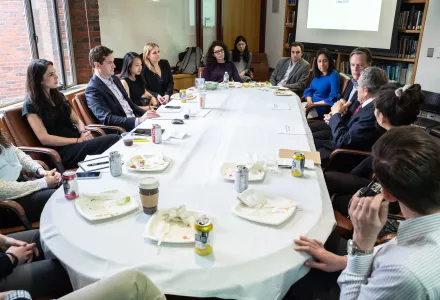
Seventy-two years ago the Marshall Plan, widely hailed as a masterpiece of American post-war statecraft, dispatched aid worth nearly 5 percent of U.S. GDP to reinvigorate Western Europe’s war-ravaged economy and fend off Soviet encroachment.
“It is logical,” Secretary of State George Marshall declared in a famous 1947 commencement speech at Harvard laying out the plan’s vision, that America “assist in the return of normal economic health in the world, without which there can be no political stability and no assured peace.” On this foundation of economic health, the Western powers built the political, military, and economic alliances that won the Cold War.
Today, nations are relying on various forms of economic statecraft to achieve geopolitical objectives—from China’s expansive overseas infrastructure investment through the Belt and Road Initiative, to American sanctions policy in Iran, to the global race for dominance in critical technology sectors. This spring, the Belfer Center, in partnership with the Mossavar-Rahmani Center for Business and Government, launched an initiative to explore these and other tools of economic statecraft, their impact on international relations, and implications for global leaders.
The Economic Diplomacy Initiative, advised by Faculty Co-Chairs Professor Nicholas Burns and Professor Lawrence H. Summers and led by Center Executive Director Aditi Kumar, kicked off this semester with a conversation with Kai-Fu Lee, a leading technologist and investor in Chinese high-tech companies.
The Initiative aims to examine three facets of economic statecraft. First, as economic power and responsibility shift to a broader group of states, how will policymakers set a clear vision for the international economic order to facilitate multinational commerce? Second, how can and should policymakers deploy economic tools—trade, investment, sanctions, aid, and other policies—to promote geopolitical interests? Third, in an era of unprecedented global competition, how can policymakers support domestic competitiveness and innovation in critical sectors?
In the spirit of the Center’s mission to prepare future generations of leaders, the initiative is driven by Harvard Kennedy School students with an interest in exploring the intersection of economic and international affairs. In addition to faculty- supervised research, students are planning a policy conference and developing an immersive training program on economic diplomacy, both to be rolled out this fall.
"Center Expands Focus on Economic Diplomacy and Its Global Impacts." Belfer Center Newsletter, Belfer Center for Science and International Affairs, Harvard Kennedy School (Summer 2019).
